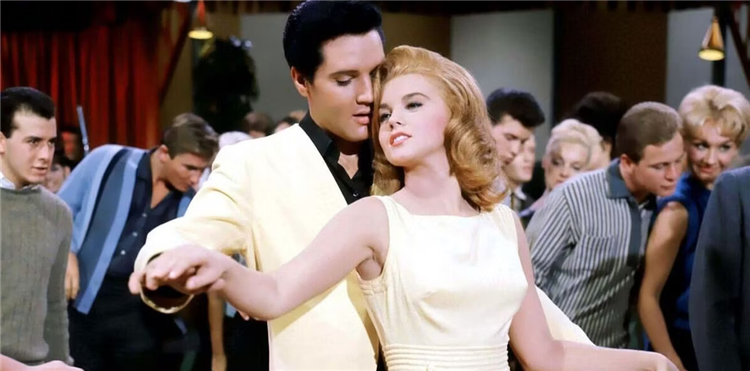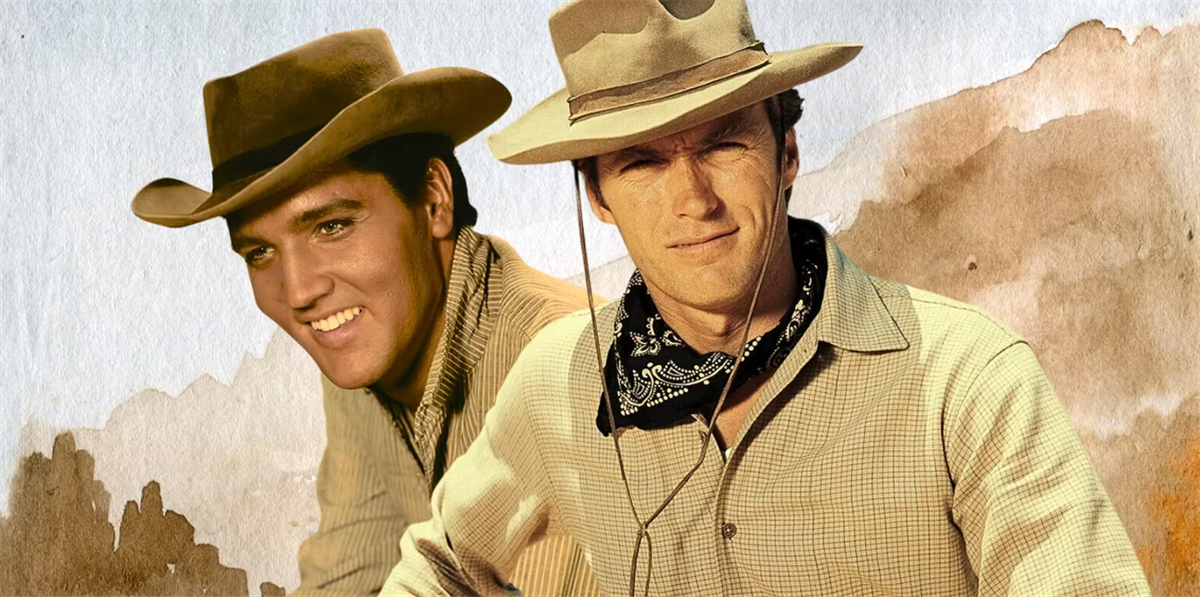While it was a good move for iconic silver-screen gunslinger Clint Eastwood, the same can’t be said for Elvis Presley.
- Clint Eastwood turned down the lead role in Charro! because it didn’t have the same star power or level of drama as his previous work in the Man With No Name trilogy.
- Despite its success at the box office, Charro! was missing something, and that something was Elvis Presley’s singing. Audiences were disappointed that The King never sang a single note in the film.
- The decision to not have Elvis sing in the movie may have been a good one for Clint Eastwood, but it left Elvis feeling somewhat abandoned and without a song to sing.
Sometimes the careers of iconic legends pass like two ships in the night, unaware that their paths have come so close together. That was the case with the greatest rock and roll icon of all time and arguably the biggest Western movie star ever. The year was 1969 and the film in question was looking for the newest star in Hollywood whose trajectory was pointing due North. It had the established gunslinger star Clint Eastwood written all over it. The movie was called Charro! and Eastwood was approached to play the lead role of an ex-gang leader turned good guy. When he turned it down per author Victor Adam’s Elvis Encyclopedia, it landed in the hands of none other than “The King” himself, Elvis Presley, who snatched up the role of a redeemed, Jess Wade.
With the film taking the King for a spin, especially in being the only movie audiences saw him with a scruffy beard, what was it about Charro! that Eastwood turned down? After all, the film had the charm of Presley and a strong Western theme that was permeating cinema during the late 1960s.
What Is ‘Charro!’ About?

Jess Wade (Presley) is a bad guy who has broken good and wants to defend the people of a small Mexican town from his former dangerous and motley crew of ne’er-do-wells who have bad intentions — some seriously bad men. At the beginning of the film, Jess wastes no time walking into the town saloon and getting into a gunfight with his former crew. The bandits ride Jess out of town thinking that roughing him up and making him the target of a Mexican Federales search party will be the end of him, but he isn’t having any of it. Instead, he makes a move on villain Vince Hackett’s (Victor French, who is probably the best part of the film) sister Tracy (Ina Balin), but Vince doesn’t take lightly to traitors that are moving on his sister.
As a way to keep the peace, he sends Jess walking into the arid and barren desert with only his saddle to his name. After breaking a wild horse, the spurned and pissed-off cowboy rides back into Charro to settle the score and protect both his father and Tracy. Vince returns with a stolen cannon and threatens to fire upon the town. Elvis Presley is good in the role, but once you know that Clint Eastwood passed on it, it suffers by comparison. Plus, the fact that the only time we hear The King’s singing voice is during the opening credits doesn’t help.
Why Did Clint Eastwood Turn Down the Role in ‘Charro!’?

Clint Eastwood was coming off a string of smash hit spaghetti westerns that he collaborated on with Italian filmmaker, Sergio Leone. The Man With No Name trilogy was spectacular. Beginning in 1964 with For a Fistful of Dollars, followed by For a Few Dollars More in 1965, and culminating with the 1966 epic Western The Good, The Bad, and the Ugly, the Dollars Trilogy cemented Eastwood as one of the biggest names in film. When Charro! arrived at the actor’s desk, there was little chance that the burgeoning star, who would also become Dirty Harry Callahan just a few years later in 1971, was going to bite on a part that didn’t have the same star power or the level of drama and suspense as his previous work.
Again, Charro! is not an awful film as far as Westerns from the period go. But compared to the Dollars Trilogy, it’s not on the same level, and it’s debatable whether even a Morricone harmonica soundtrack and cowboy king Eastwood could have lifted a relatively staid script and story. So, Elvis Presley, who was floundering a bit in his acting career in the late ’60s jumped on the part and made a pretty good film even as his Hollywood star was fading. The whole thing has a very Three Amigos kind of vibe to it, and Eastwood would likely have never gone for that.
‘Charro!’ Did Well at the Box Office, But It Was Missing Something

While Elvis Presley might have shown his best in films like Love Me Tender, Jailhouse Rock and King Creole, his films after a certain period began to dwindle in character and story. His presence is always felt on the screen, but in some of his later films, there can be an almost robot-like lack of accentuation and emotion — almost as if he was being forced to churn out movies much to the advisement from his manager, Colonel Tom Parker. The feeling of Charro! is brought out by the supporting cast of French, and Vince’s cackling, crazed brother, Billy Roy Hackett (Solomon Sturges), whose energy also makes Presley’s performance feel a bit flat). But the biggest sticking point had nothing to do with the performance of the rock and roll icon. Audiences went to the theater thinking they were going to get to hear Presley’s silky dulcet tones in the film, but he never sings in the film.
Audiences Didn’t Like That Elvis Doesn’t Sing a Single Note

In 1969, the American public laid down a load of cash and wanted to hear some more of the legendary singer belting out some Sturgill Simpson-like pop country-western tunes only to find out that the legend only lends his voice to the opening credit sequence. It doesn’t seem fair, does it? You’ve laid down your money for what you’re expecting to be a similar musical style Elvis Presley movie, and he doesn’t sing a word? You can imagine audiences just digging into their bucket full of 1969 popcorn being excited after hearing the opening song, and spending the next hour and a half being forsaken by Charro!‘s music-less delivery. The decision may have been the best one that Eastwood has made in his long career and what was left kind of left Elvis hanging out to dry without a song to sing.
